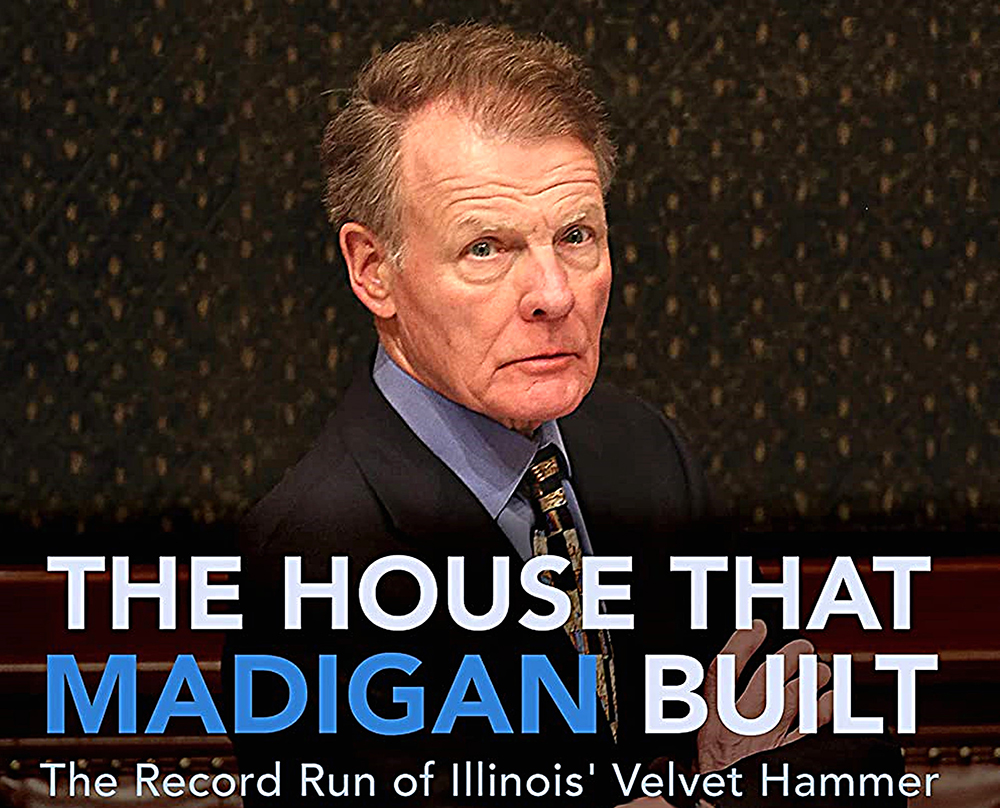
Author Ray Long takes an in-depth look at the long career in politics of former Illinois House Speaker Michael Madigan.
From The House that Madigan Built: The Record Run of Illinois’ Velvet Hammer by Ray Long. Copyright 2022 by the Board of Trustees of the University of Illinois. Used with permission of the University of Illinois Press.

By Ray Long
What does the speaker think?
At the Illinois Capitol, the question loomed over every major issue. The question came in over the phones, got whispered in the hallways, popped up at committee hearings and rolled out in press conferences. A simple query, of course, one that is expected to be asked in statehouses all across America. In Illinois, though, the answer carried far greater weight. For in Illinois politics, the speaker’s moves at the end of the 20th Century and the beginning of the 21st provided a road map for how Illinois got to where it is today.
Have you talked to the speaker about your legislation? Can you get your bill through the House? What does he want? These questions dominated internal debate in Springfield, be it on guns, pensions, education, gay rights or taxes — before a vote was contemplated, let alone taken. They were asked time after time — by Democrats and Republicans, ranking lawmakers and rookies, lobbyists, labor and business leaders, reporters and editors, generations of governors and, yes, mayors of Chicago.
All wanted to know the positions of the secretive man who did more to shape Illinois politics, government and laws than anyone in the last half century: House Speaker Michael Joseph Madigan, chairman of the Democratic Party of Illinois, committeeman of Chicago’s 13th Ward, life-long resident of the city’s Southwest Side. Wielding the gavel for all but two years from 1983 to early 2021, making him the nation’s longest-serving speaker, Madigan built the House where he ruled. But in a larger sense, he built the house where Illinoisans lived. What the speaker thought became more than an academic question. The answer gave the best clues for politicians who wondered which ideas would succeed or suffocate.
Lori Lightfoot nodded to that dynamic even before she took the oath of office as Chicago’s mayor in 2019. Despite railing against machine-style politics on her way to a historic landslide victory, Mayor-elect Lightfoot immediately traveled to Springfield to give Madigan his due. After meeting with rookie Democratic Gov. J.B. Pritzker, she went to the speaker’s Capitol suite. Lightfoot offered no apologies to her far-left critics long tired of the speaker’s Springfield reign. She gave a carefully worded comment to reporters eager to hear what went down between the incoming Democratic mayor — the Black, openly gay, progressive, former federal prosecutor — and the all-powerful speaker — a straight, white Democrat schooled in Irish, ward-style politics a half-century earlier by Mayor Richard J. Daley, the party boss who perfected the Chicago machine. “The speaker occupies an important space in state government,” Lightfoot said. “We’re not going to be aligned on every issue, but he’s an important person to the city of Chicago.”
Understated, to be sure, Lightfoot’s neutral remarks acknowledged the clear political and practical realities: Loved, revered, hated or feared, Madigan commanded an outsized role. It all played into the Madigan Mystique — which existed somewhere between real and perceived power. Whether one viewed Madigan as a genius, a jerk or both, he managed consistently to mesmerize his admirers and frustrate his foes. Madigan’s political opponents found themselves beaten down so often by his persistent but subtle force that he became known early on as “The Velvet Hammer.”
Madigan long wanted to be a powerful leader, much in the form of his mentor, the first Mayor Daley. And Madigan fulfilled that goal a thousand times over, the student expanding on his mentor’s playbook throughout all branches of state and local government, from judges to county officeholders to statewide officials.
“The person that finds themselves as a leader in the legislature is pretty much in the position to shape exactly how they wish to perform their job. They can be strong or they can be weak. Active or passive. In my case, I decided years ago that I wanted to be a strong legislative leader, an active legislative leader,” Madigan once mused.
A frustrated Republican Gov. Bruce Rauner, who repeatedly tried and failed to outmaneuver Madigan, blurted out during his unsuccessful 2018 re-election campaign: “I’m not in charge. I’m trying to get to be in charge.” No one in Springfield wondered what Rauner meant.
In November 2018, Democrat J.B. Pritzker beat Rauner. And Madigan? The speaker won the largest number of House Democrats he’d ever controlled — a 74-44 supermajority. A little over two weeks before lawmakers adjourned their first spring session under Pritzker in 2019, though, the FBI quietly raided the homes of three longtime Madigan associates — a former aide ousted in a sexual harassment scandal, a former alderman in a neighboring ward and a former Commonwealth Edison contract lobbyist, Michael McClain, a former Democratic representative and one of the speaker’s closest confidants. Before year’s end, the Tribune reported that federal authorities had tapped McClain’s phone and had begun asking questions about Madigan and his allies.
In the summer of 2020, prosecutors put the spotlight directly on Madigan. They charged Commonwealth Edison with a “years-long bribery scheme” tied to giving jobs, contracts and payments to a roster of Madigan’s political allies in hopes of winning favorable treatment on the utility’s big legislative agenda. Commonwealth Edison agreed to pay a $200 million fine and vowed to cooperate in a deferred prosecution agreement. Madigan was not charged and emphatically denied wrongdoing, but prosecutors implicated the speaker and gave him an unwanted designation: “Public Official A.”
Republicans piled the ComEd scandal onto anti-Madigan narratives in races up and down the ballot. An Illinois Supreme Court justice he backed lost. Voters defeated Pritzker’s proposal — which Madigan supported — to amend the Constitution so people with the biggest incomes would pay higher taxes. Prosecutors then delivered more uncomfortable post-election news: McClain was indicted with a top former ComEd executive and two other lobbyists. Instead of seeing Madigan as invincible, a bloc of 19 mostly female House Democrats viewed him as a political liability. And then the unthinkable happened: He lost the speakership. Democratic Rep. Emanuel “Chris” Welch of Hillside, a Madigan ally, put together the votes and became the first Black speaker in Illinois history. Madigan’s ability to adapt had faded, and his power had slipped away.
Ray Long is an investigative reporter for the Chicago Tribune who has spent more than 40 years covering longtime Speaker Michael Madigan, including as the Springfield correspondent for the Peoria Journal Star. This article is adapted from his new book: “The House That Madigan Built: The Record Run of Illinois’ Velvet Hammer.”

2 comments for “The long reign of ‘The Velvet Hammer’”